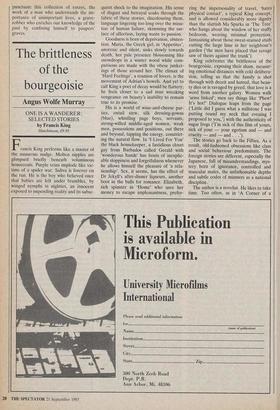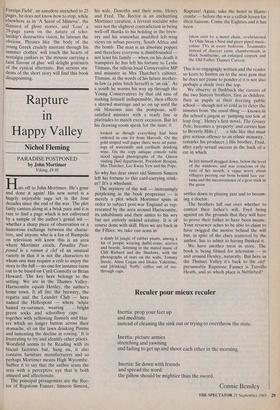The brittleness of the bourgeoisie
Angus Wolfe Murray
ONE IS A WANDERER: SELECTED STORIES by Francis King
Hutchinson, f9.95
Francis King performs like a master of the nauseous nudge. Molten nipples are glimpsed briefly beneath voluminous housecoats. Purple veins implode like vic- tims of a spider war. Saliva is forever on the run. He is the boy who believed once that babies are left under brambles, by winged nymphs in nighties, an innocent exposed to impending reality and its subse-
quent shock to the imagination. His sense of disgust and betrayal soaks through the fabric of these stories, discolouring them, language lingering too long over the minu- tiae of human failure, skimming the sur- face of affection, laying waste to passion.
Goodness is born of deprivation, absten- tion. Maria, the Greek girl, in 'Appetites', anorexic and silent, sinks. slowly towards death, her pale presence blossoming like snowdrops in a winter wood while com- parisons are made with the obese junket- ings of those around her. The climax of `Hard Feelings', a reunion of lovers, is the movement of Adrian's bowels. And yet to call King a poet of decay would be flattery; he feels closer to a sad man wreaking vengeance on beauty's inability to remain true to its promise.
His is a world of wine-and-cheese par- ties, oxtail stew, silk dressing-gowns (blue), whistling page boys, servants, strong-willed middle-aged women, weak men, possessions and positions, out there and beyond, tapping the energy, constrict- ing the natural flow. In `I Lived For You' the black housekeeper, a fastidious closet gay from Barbados called Gerald with `wonderous hands' has bouts of inexplic- able sloppiness and forgetfulness whenever he allows himself the pleasure of 'a rela- tionship'. Sex, it seems, has the effect of Dr Jekyll's after-dinner liqueurs, another boot in the balls for romance. Elizabeth, rich spinster in `Home' who uses her money to escape unpleasantness, prefer-
ring the impersonality of travel, 'hates physical contact', a typical King concept, and is allowed considerably more dignity than the skittish Ma Sparks in 'The Tree' who hangs about the window of her stuffy bedroom, wearing minimal protection, fantasising about those sweat-stained studs cutting the large lime in her neighbour's garden (`the men have placed that savage saw of theirs against the trunk').
King celebrates the brittleness of the bourgeoisie, exposing their sham, measur- ing emotional distances with cold delibera- tion, telling us that the family is shot through with deceit and hatred, that beau- ty dies or is ravaged by greed, that love is a word from another galaxy. Women walk `arms linked'; men say things like 'Phew! It's hot!' Dialogue leaps from the page (little did I guess what a millstone I was putting round my neck that evening I proposed to you,') with the authenticity of sugar frogs ('I'm sick of this film of yours, sick of your — your egotism and — and cruelty — and — and . . .').
The stories go back to the Fifties. As a result, old-fashioned obsessions like class and social behaviour predominate. The foreign stories are different, especially the Japanese, full of misunderstandings, mys- tery born of ignorance, controlled and muscular males, the unfathomable depths and subtle codes of manners as a national discipline.
The author is a novelist. He likes to take time. Too often, as in 'A Corner of a Foreign Field', an anecdote stretched to 25 pages, he does not know how to stop, while elsewhere as in 'A Scent of Mimosa', the flimsiest of ghost stories, and 'Loss' a 29-page yawn on the nature of scho- larship's destructive vision, he labours the obvious. Phrases like 'the body of the young Greek crudely insistant through his summer clothes' will touch the hearts of nostalgia junkies as 'the mousse carrying a faint flavour of glue' will delight gourmets of the cynical aftertaste. But serious stu- dents of the short story will find this book disappointing.















































 Previous page
Previous page